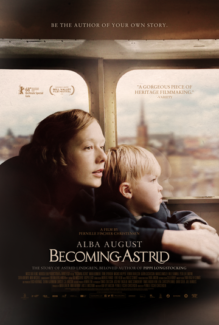Becoming Astrid (Christensen, 2018): Sweden
Reviewed by Larry Gleeson. Viewed via screener’s link provided by Marina Bailey Film Publicity.
 Music Box Film’s Becoming Astrid, directed by acclaimed Danish filmmaker Pernille Fischer Christensen and inspired by events in Swedish author and literary icon (Pippi Longstocking) Astrid Lindgren’s formative years, is an engaging, heartfelt story of a teenaged Astrid Lindgren, played by Alba August in a breakthrough performance that delvers an emotionally riveting sojourn of the young writer’s early religious upbringing and her advent in becoming a storyteller of mythical proportions. Director Christensen studied at the National Film School of Denmark. Her debut feature, A Soap, won Denmark’s 2006 top film award, the Bodil, for Best Film, and the Berlin Film Festival’s Silver Bear. A Family won the 2010 Berlin Film Festival’s Fipresci Prize. In 2014, she won the Los Angeles Film Festival’s Best Narrative Feature and Audience Awards for Someone To Love. Becoming Astrid is her fifth feature film. Alba is the daughter of Swedish actress Pernille August and Oscar-winning Danish director Bille August. She was awarded the Shooting Star award at the 2018 Berlin International Film Festival as up and coming European actress.
Music Box Film’s Becoming Astrid, directed by acclaimed Danish filmmaker Pernille Fischer Christensen and inspired by events in Swedish author and literary icon (Pippi Longstocking) Astrid Lindgren’s formative years, is an engaging, heartfelt story of a teenaged Astrid Lindgren, played by Alba August in a breakthrough performance that delvers an emotionally riveting sojourn of the young writer’s early religious upbringing and her advent in becoming a storyteller of mythical proportions. Director Christensen studied at the National Film School of Denmark. Her debut feature, A Soap, won Denmark’s 2006 top film award, the Bodil, for Best Film, and the Berlin Film Festival’s Silver Bear. A Family won the 2010 Berlin Film Festival’s Fipresci Prize. In 2014, she won the Los Angeles Film Festival’s Best Narrative Feature and Audience Awards for Someone To Love. Becoming Astrid is her fifth feature film. Alba is the daughter of Swedish actress Pernille August and Oscar-winning Danish director Bille August. She was awarded the Shooting Star award at the 2018 Berlin International Film Festival as up and coming European actress.
After young Astrid accepts an internship at a local newspaper, she catches the eye of the married editor, Mr. Blomberg, portrayed by Henrik Rafaelsen and soon becomes pregnant. Forced to leave her childhood home for Copenhagen to avoid the public outcry that could potentially remove her family from their stewardship of church land and to secretly give birth to a bastard child, Astrid perseveres learning difficult life lessons, eventually settling in Stockholm when her parents refuse her with her new son, Lars (Lasse). Reluctantly, Astrid leaves Lasse with a foster mother, Marie, portrayed by Trine Dyrholm, during her exiled time in Stockholm. Saving her money from a paltry secretary’s salary, Astrid visits young Lasse when she can. After Marie falls ill, Astrid uses her imagination and flair for storytelling to reconnect with her child. In spite of her struggles, Astrid emerges with a newfound courage that will form the foundation of a vast and beloved body of literary work.
Astrid Lindgren is mostly remembered for her Pippi Longstocking and Karlsson-on-the-Roof book series. Her titles have been translated into 85 languages and published in over 100 countries. Selling approximately 165 million books worldwide, much of her writing was based on her childhood memories growing up in a small Swedish village. Outspoken on topics as diverse as the Vietnam War, children refugees, nuclear power, and urban planning, she always had children and their future at the center of her concerns. In 1958, Lindgren received the Hans Christian Andersen Medal, the top international award in children’s literature.
Becoming Astrid is an excellent film technically. The version I viewed was in Swedish and Danish with English subtitles and came in with a run time of a smooth 123 minutes. In addition, the film contained well-rounded cinematography, seamless continuity editing, a strong narrative structure, stellar acting performances, a beautiful mise-en-scene, and an uplifting and complementary, non-diagetic, musical score. Becoming Astrid recently won the Audience Award for Best Foreign-Language Feature in October at the recent Chicago International Film Festival and is a highly recommended film!
About this entry
You’re currently reading “Becoming Astrid (Christensen, 2018): Sweden,” an entry on Student Film Reviews
- Published:
- 11.23.18 / 9pm
- Category:
- Films
No comments
Jump to comment form | comments rss [?]